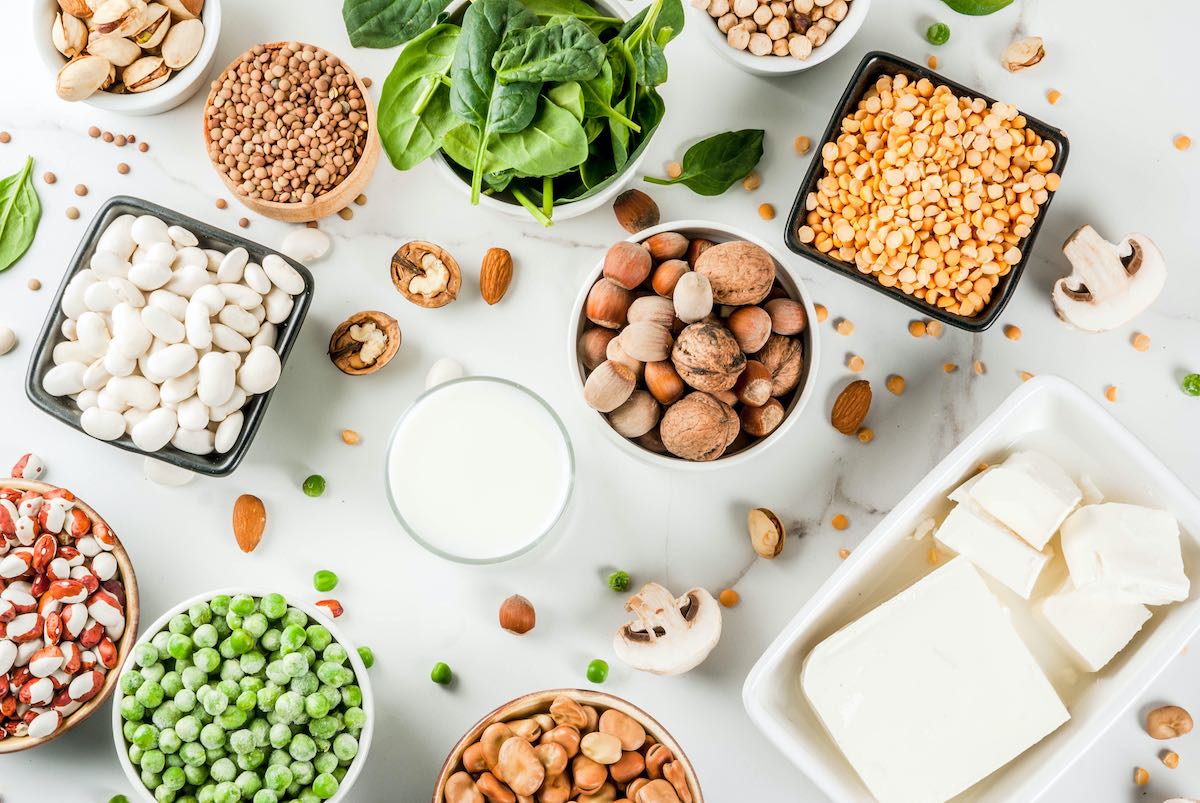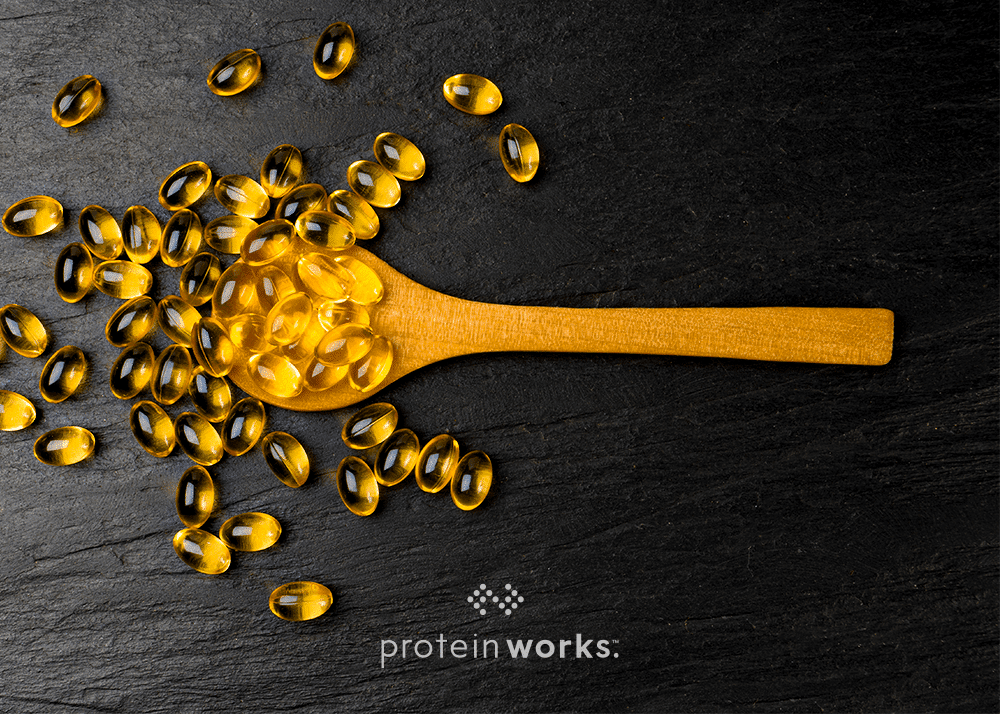
10 Benefits Of Going Vegan
Est. Reading Time: 8 Minutes
Joker star Joaquin Phoenix has been one since he was four years old (1). Venus Williams credits it with changing her whole life (2). And Ariana Grande says it can make you “an all-around happier person” (3). We are, of course, talking about veganism. But it’s not just celebrities that are moving to a diet free from animal products.
According to research conducted via The Vegan Society, 7.2 million British adults currently follow a meat-free diet (4) and Google searches for ‘vegan food near me’ experienced a more than 5000% increase last year. (5). It’s predicted that by 2026 the global vegan food market will be worth $24.3 billion (6).
So what is it about veganism that’s prompted the soar in popularity in recent years? Let’s examine some of the latest research into the benefits of going vegan.
Here are our 10 benefits of going Vegan:
- You could live longer
- You could have more energy
- You could lose weight
- It could help manage diabetes
- It could help reduce arthritic pain
- It could help reduce cholesterol
- It could lower the risk of some cancers
- It could benefit heart health
- It could improve gut health
- It could save the planet
You could live longer
Speaking to the Mirror, international chart-topper Ariana Grande said she was “a firm believer in eating a full plant-based, whole diet that can expand your life length” (3). A study published in the JAMA Internal Medicine Journal seems to back this up (7).
After monitoring 130,000 people’s health and diet records over the course of 30 years, scientists at Massachusetts General Hospital found that every 3% increase in calories from plant protein was found to reduce the risk of death by 10%. Switching eggs for plant protein led to a 19% reduction in death risk and ditching unprocessed red meat saw a 12% drop.
In other words, the stats suggested that vegans were considerably less likely to die at a young age than people who ate meat, eggs, and dairy-based products.
You could have more energy
During the 193-mile Malaysian Grand Prix, the drivers burn an estimated 1,500 calories and lose three quarts of body fluid (8). So it’s no wonder staying energised is top of Lewis Hamilton’s priorities. “You want to have energy, to be consistent,” the Formula 1 driver told GQ magazine. “You don’t want to have the big oscillations and highs and lows in your energy levels. Veganism eradicated that.” (9)
He’s not the only celebrity with anecdotal evidence of the energising benefits of veganism. Liam Hemsworth told AskMen that he was converted to a plant-based diet by Hunger Games star Woody Harrelson who has “more energy than anyone I’ve ever met.” Since going vegan, Hemsworth has “felt amazing and have been eating that way ever since” (10)
This could be due to animal-based foods taking a lot of energy to digest, which can lead to post-meal drowsiness. The likes of nuts, grains and legumes, however, have a low glycemic index, which stabilises your blood sugar and wards off energy crashes.
You could lose weight
Vegan foods tend to be lower in calories and have less saturated fat than animal products (11). This could be why weight loss studies have found that those following a vegan diet had a lower body mass index (BMI) and lost more weight than people on other diets (12).
A further study published in the Journal of General Internal Medicine seemed to back this up. Over a period of 18 weeks, people on a vegan diet lost an average of four pounds more than those whose diet included meat. (13)
It could help manage diabetes
According to the NHS, about 90% of adults with diabetes in the UK have type 2 which can be managed by regular exercise, maintaining a healthy body weight, and healthy eating (14).
Following a vegan diet helps people better manage type 2 diabetes according to researchers at the University of London, the University of Northampton, and East Sussex NHS Healthcare Trust (15). In fact, another study reported that a plant-based diet was one of the most crucial factors in preventing type 2 diabetes and stabilising blood sugars to a healthy range (16).
A further study compared a low-fat vegan diet against a conventional diabetes diet. Results showed that while both diets improved blood sugar and cholesterol levels in type 2 diabetics, the vegan diet affected these levels more (17).
It could help reduce arthritic pain
Rheumatoid arthritis affects about 1% of the world’s population (18). A number of studies have investigated the link between diet and self-reported symptoms in patients with arthritis.
One study focused on participants with osteoarthritis who were randomly given a whole-food, plant-based vegan diet, or their regular omnivorous diet. At the end of six weeks, the vegan group reported greater improvements in energy levels, vitality and physical functioning (19).
Another review of the potential use of plant-based diets found that diets rich in fruits, fibre and vegetables have anti-inflammatory properties and help reduce pain and inflammation in patients with rheumatoid arthritis. (18).
It could help reduce cholesterol
Low-density lipoprotein (LDL) cholesterol is commonly referred to as the bad cholesterol because high LDL levels can lead to a build-up of cholesterol in arteries. Eating saturated animal fat generates more LDL cholesterol so switching to a meat-free diet could reduce bad cholesterol and heart attacks (20)
One Swedish study investigated if a vegan diet could lower cholesterol and other indicators of cardiovascular disease in people with rheumatoid arthritis. The trial found a reduction in both bad LDL cholesterol and weight in the participants on a vegan diet. (21).
It could lower the risk of some cancers
There are a reported 2.5 million people living with cancer in the UK (22). According to the World Health Organization, ‘diets high in fruits and vegetables may have an independent protective effect against many cancers’ (23).
This is backed up by research suggesting that eating at least seven portions of fresh fruit and vegetables each day may lower the risk of dying from cancer by up to 15% (24). Vegan diets tend to contain more soy products – which may offer some protection against breast cancer (25) – and avoid dairy products which some research suggests may slightly increase the risk of prostate cancer (26).
It could benefit heart health
A comparative review of the health of 48,000 meat-eaters, pescatarians, vegetarians, and vegans over 18 years found that those on a vegan or vegetarian diet had a lower risk of heart disease. The non-meat-eaters had 10 fewer cases of heart disease per 1,000 participants than the meat-eaters. The study also reported a higher risk of stroke in the non-meat-eaters (three more per 1,000 people than the meat-eaters) (27).
Research has also reported a link between a vegan diet and a healthy heart. Those whose diets were higher in plant foods and lower in animal foods were associated with a lower risk of cardiovascular morbidity and mortality (28).
It could improve gut health
Microbiomes are the good bacteria that live in the digestive tract. Fibre helps cultivate gut bacteria so a vegan diet high in fibre – which is found in vegetables and whole grains – can lead to healthier gut microbiomes (29).
Sticking to a strict vegan diet cultivates different types of bacteria that can help lower inflammation in the gut and may have other benefits such as boosting metabolism (30).
It could save the planet
Lewis Hamilton once told his Instagram followers that embracing veganism is the “only way to truly save our planet” (31).
An Oxford University study into the damage farming does to the planet reported that animal farming provides just 18% of calories but takes up 83% of our farmland. Echoing Hamilton’s sentiment, Oxford University’s Joseph Poore, who led the research, stated that ‘a vegan diet is probably the single biggest way to reduce your impact on planet Earth’ (32).
Further research suggests that if the world went vegan it could save eight million human lives by 2050, reduce greenhouse gas emissions by two thirds, lead to healthcare-related savings, and avoid climate damages of $1.5 trillion. (33).
To find out more about vegan diets, be sure to check out this handy NHS guide, which includes some top tips on how to introduce a varied and balanced vegan diet.
And if all this vegan chat has left you peckish for some plant-based protein, we can highly recommend this smooth and creamy Vegan Wondershake!
Reference List:
- https://collider.com/joaquin-phoenix-interview-you-were-never-really-here/#animal-rights-vegan
- https://www.health.com/condition/autoimmune-disease/venus-williams-raw-vegan-diet
- https://www.mirror.co.uk/3am/celebrity-news/ariana-grande-i-love-animals-4754625
- https://www.vegansociety.com/news/media/statistics#vegandietintheuk
- https://vegnews.com/2021/12/google-searches-for-vegan-food
- https://www.theguardian.com/lifeandstyle/2019/dec/29/is-veganism-as-good-for-you-as-they-say
- Mingyang Song, MD, ScD; Teresa T. Fung, ScD; Frank B. Hu, MD, PhD; et al Walter C. Willett, MD, DrPH; Valter D. Longo, PhD; Andrew T. Chan, MD, MPH; Edward L. Giovannucci, MD, ScD. Association of Animal and Plant Protein Intake With All-Cause and Cause-Specific Mortality. JAMA Intern Med. 2016
- https://www.wired.com/2015/03/f1-drivers-push-bodies-extremes-malaysias-heat/
- https://www.gq-magazine.co.uk/cars/article/lewis-hamilton-interview-2020
- https://uk.askmen.com/sports/foodcourt/liam-hemsworth-shares-his-vegan-diet.htm
- Turner-McGrievy GM, Barnard ND, Scialli AR, Lanou AJ. Effects of a low-fat vegan diet and a Step II diet on macro- and micronutrient intakes in overweight postmenopausal women
- Gabrielle M.Turner-McGrievyPh.D., R.D. Charis R. DavidsonM.P.H. Ellen E.WingardM.P.H., R.D. SaraWilcoxPh.D. Edward A.Frongillo Ph.D. Comparative effectiveness of plant-based diets for weight loss: A randomized controlled trial of five different diets
- Ru-Yi Huang MD, MPH, Chuan-Chin Huang ScD, Frank B. Hu MD, PhD & Jorge E. Chavarro MD, ScD. Vegetarian Diets and Weight Reduction: a Meta-Analysis of Randomized Controlled Trials
- https://www.nhs.uk/conditions/diabetes/
- Anastasios Toumpanakis, Triece Turnbull, Isaura Alba-Barba. Effectiveness of plant-based diets in promoting well-being in the management of type 2 diabetes: a systematic review
- Frank Qian, MPH; Gang Liu, PhD; Frank B. Hu, MD, PhD; et al. Association Between Plant-Based Dietary Patterns and Risk of Type 2 Diabetes. A Systematic Review and Meta-analysis
- Barnard ND, Scialli AR, Turner-McGrievy G, Lanou AJ, Glass J. A low-fat vegan diet and a conventional diabetes diet in the treatment of type 2 diabetes: a randomized, controlled, 74-wk clinical trial. American Journal of Clinical Nutrition, 2009
- Jihad Alwarith, Hana Kahleova, Emilie Rembert, Willy Yonas, Sara Dort, Manuel Calcagno, Nora Burgess, Lee Crosby and Neal D. Barnard. Nutrition Interventions in Rheumatoid Arthritis: The Potential Use of Plant-Based Diets. A Review
- Clinton, C. M. et al. Whole-Foods, Plant-Based Diet Alleviates the Symptoms of Osteoarthritis. Arthritis, 2015
- https://www.nhs.uk/news/food-and-diet/is-a-vegan-diet-heart-friendly/
- Ann-Charlotte Elkan, Beatrice Sjöberg, Björn Kolsrud, Bo Ringertz, Ingiäld Hafström & Johan Frostegård. Gluten-free vegan diet induces decreased LDL and oxidized LDL levels and raised atheroprotective natural antibodies against phosphorylcholine in patients with rheumatoid arthritis: a randomized study. Arthritis Research & Therapy Journal
- Maddams J, Utley M, Møller H. Projections of cancer prevalence in the United Kingdom, 2010-2040. Br J Cancer 2012; 107: 1195-1202. (Projections scenario 1). Macmillan analysis based on extrapolation of 2010 and 2020 projections that the number of people living with cancer will hit an estimated 2.5 million in 2015
- https://www.who.int/cancer/prevention/en/
- Oyebode O, Gordon-Dseagu V, Walker A, Mindell JS. Fruit and vegetable consumption and all-cause, cancer and CVD mortality: analysis of Health Survey for England data
- Zhang C, Ho SC, Lin F, Cheng S, Fu J, Chen Y. Soy product and isoflavone intake and breast cancer risk defined by hormone receptor status
- Aune D, Navarro Rosenblatt DA, Chan DS, Vieira AR, Vieira R, Greenwood DC, Vatten LJ, Norat T. Dairy products, calcium, and prostate cancer risk: a systematic review and meta-analysis of cohort studies
- Tammy Y N Tong, Paul N Appleby, Kathryn E Bradbury, Aurora Perez-Cornago, Ruth C Travis, Robert Clarke, Timothy J Key. Risks of ischaemic heart disease and stroke in meat eaters, fish eaters, and vegetarians over 18 years of follow-up: results from the prospective EPIC-Oxford study BMJ 2019; 366
- Hyunju Kim, Laura E. Caulfield, Vanessa Garcia‐Larsen, Lyn M. Steffen, Josef Coresh, and Casey M. Rebholz. Plant‐Based Diets Are Associated With a Lower Risk of Incident Cardiovascular Disease, Cardiovascular Disease Mortality, and All‐Cause Mortality in a General Population of Middle‐Aged Adults
- Lawrence A. David, Corinne F. Maurice, Rachel N. Carmody, David B. Gootenberg, Julie E. Button, Benjamin E. Wolfe, Alisha V. Ling, A. Sloan Devlin, Yug Varma, Michael A. Fischbach, Sudha B. Biddinger, Rachel J. Dutton, and Peter J. Turnbaugh. Diet rapidly and reproducibly alters the human gut microbiome
- Kim MS, Hwang SS, Park EJ, Bae JW. Strict vegetarian diet improves the risk factors associated with metabolic diseases by modulating gut microbiota and reducing intestinal inflammation
- https://www.independent.co.uk/life-style/food-and-drink/lewis-hamilton-vegan-training-formula-one-plant-based-food-a9293696.html
- https://www.theguardian.com/environment/2018/may/31/avoiding-meat-and-dairy-is-single-biggest-way-to-reduce-your-impact-on-earth
- Marco Springmann, H. Charles J. Godfray, Mike Rayner, and Peter Scarborough. Analysis and valuation of the health and climate change cobenefits of dietary change




No Comments yet!